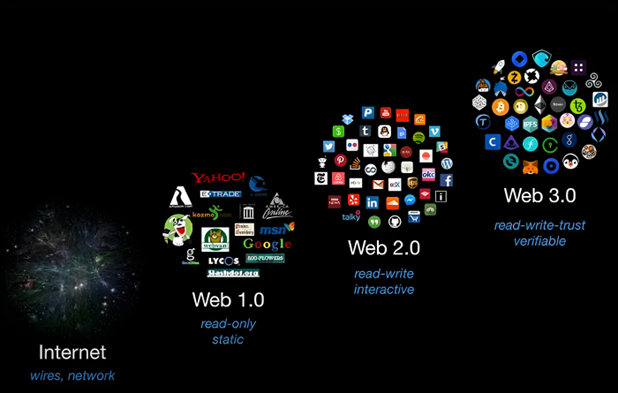 |
| By Jurica Dujmovic |
The rise of blockchain technology and cryptocurrencies has sparked a revolutionary shift toward the "ownership economy."
Also called “web3,” the idea is for a decentralized digital landscape where individuals have unprecedented control and ownership over their assets and data.
How? By leveraging the blockchain's inherent transparency and security to facilitate peer-to-peer transactions to eliminate the need for centralized intermediaries.
Now let’s put that into simpler terms.
Right now, corporations control the internet. We call this structure “web2.” Sure, you can customize your online experience to an extent, but you are not in complete control. For example, when you go to any website, that website will usually collect your data and sell it … without needing your consent.
The ownership economy wants to change that so you — and only you — ever have control over your digital footprint.
And it goes one step further, pushing for the democratization and decentralization of digital spaces. Just think about it: Social media platforms that are owned and controlled by the users, not a megacorporation making decisions based on the bottom line.

And the key to this revolution will be the mainstream adoption and utilization of blockchain technology.
This democratization of ownership promises to upend traditional power structures across various industries, from finance and social media to art and content creation.
And as a crypto enthusiast, journalist and investor, I've witnessed firsthand how this paradigm is already starting to reshape our perceptions of digital ownership.
Decentralized finance platforms like Compound (COMP, “E+”) and Uniswap (UNI, “B”) are revolutionizing the financial sector by allowing users to participate in governance and earn from their contributions. These platforms distribute governance tokens, which give users a say in platform decisions and a share in the profits.
This aligns the interests of the users and the platform, fostering a more cooperative financial ecosystem.
And it isn’t just doing so in the crypto space. Indeed, the decentralizing force of the ownership economy is already an undeniable reality upending legacy sectors and business models.
Platforms like Sleek provide excellent case studies for the ownership economy in action. Launched in April 2023, Sleek is a social networking platform that bridges digital and real worlds.
In other words, it has reimagined social networking as blockchain-native infrastructure.
Through on-chain social assets, like their flagship Sleek Card, Sleek empowers users to own the connections and personal data that has long been exploited by web2 platforms … and use them to navigate the web3 world seamlessly.
That Sleek Card, for example? It leverages near field communication, or NFC, technology to create a blockchain-based digital identity and cryptocurrency wallet for each user, providing a crucial on-ramp into blockchain-powered services.
By anchoring user identities and interactions on-chain, Sleek empowers collective ownership over the network while disincentivizing rent-seeking data harvesting. Its principled embrace of decentralized ownership embodies the transformative vision of the ownership economy.
As of mid-2024, Sleek had facilitated over 300,000 on-chain connections, solidifying its role as a dominant force in the web3 social media landscape.
But Sleek is just one example out of many. More businesses are showcasing a paradigmatic shift in relationship with user data and monetization potential.
While facing controversies around recent platform changes, Reddit — the popular social news and forum site — is another example of a company that has taken notable strides in embracing tokenized economies and community ownership.
Its Community Points system rewards users with crypto tokens for their contributions and engagement within specific subreddit communities. These tokens can be used to purchase special membership tiers, customized badges and emojis and other unique community perks and experiences.
More than just gamifying interactions, Community Points cultivate a genuine sense of stakeholder ownership and investment among members. Active participants quite literally earn equity in the communities they help foster.
This incentive model encourages higher quality discourse and content creation, as members have skin in the game. It also enables more participatory community governance, with token-weighted voting empowering invested members to collectively steward their digital neighborhoods.
While still in its early days, Reddit's tokenized communities represent a promising first step toward a decentralized, user-owned social platform cooperative model.
As mainstream adoption grows, similar blockchain-based ownership economies could provide an alternative trajectory for social networks. One where users, not corporations, control the platform roadmaps, monetization and data rights.
Reddit's experiment showcases how token incentives can fundamentally reinvent the dynamics, governance and value flows within digital communities.
But this is just the tip of the proverbial iceberg.
For artists and content creators, the ownership economy has been the biggest game-changer of them all. And you’ve likely heard of how this revolution rolled out in that sector already. After all, that’s what non-fungible tokens have brought to the realm of digital content.
NFTs allow creators to maintain control over their work and earn directly from their audience. No more middlemen taking a cut, creators can sell their digital art, music or writings directly to their fans, ensuring a fair distribution of profits.
For instance, digital artists like Beeple have made headlines by selling their work as NFTs for millions of dollars by cutting out the middlemen who would otherwise take substantial fees.
Moreover, NFTs offer a new level of engagement and interaction between creators and their audiences. Fans can purchase and own unique pieces of digital content to gain a more personal and direct connection with the creators.
This not only enhances the value of the content but also fosters a loyal and invested community. Artists can also benefit from smart contracts embedded in NFTs, which can automatically provide them with royalties from secondary sales, ensuring ongoing revenue whenever their work is resold.
As this asset class continues to develop, I expect to see the benefit of NFTs expand into other creative fields such as writing, film and gaming.
While the ownership economy holds immense promise, it also faces three primary challenges.
- First is the legal landscape, which for digital ownership is still evolving. Intellectual property rights and data protection laws need to adapt to the complexities introduced by blockchain technology. In turn, smart contracts must comply with legal standards.
- Security is also a concern. Blockchain networks are not immune to hacks and exploits. So robust security measures are essential to protect user assets and maintain trust in decentralized systems.
- Finally comes scalability. Some blockchains are already struggling to handle the increasing number of transactions and users efficiently. And if mainstream adoption of blockchain technology is the goal, realistic scaling solutions need to be a priority.
Solutions like Ethereum's Layer-2 technologies are promising, but there's still a long way to go.
Regardless of the growing pains, the cultural and economic shift of the ownership economy is coming. By decentralizing control and empowering users, it promises to create a more equitable and transparent digital ecosystem. As technology progresses, the ownership economy will likely expand its reach, influencing various sectors from finance to social media and beyond.
So, if there is a digital sector that interests you, I suggest looking into ways that community is planning for this paradigm shift … and how you can benefit from it.
It could be NFTs representing digital content you’re a fan of …
Or crypto rewards from your favorite social media site …
Or governance tokens of your favorite DeFi platform.
But whichever path you choose, you don’t want to be left behind in this revolution.
Best,
Jurica Dujmovic
P.S. You also don’t want to miss out on our Superyield Conference which will take place this coming Tuesday, June 11, at 2p.m. Eastern.
I’m not sure if you’ve noticed, but TradFi just isn’t delivering the type of yields investors have typically been able to find. Especially when inflation eats most of that value.
But DeFi has an answer.
In this conference, Dr. Martin Weiss will sit down with DeFi expert and fellow Weiss Crypto Daily contributor Marija Matić to show you how you can start earning annual percentage yields of 16% and 17% on keep-safe funds, plus annual yields of 169% on investment funds.
And no, those numbers aren’t typos.
If you’re interested in learning more — or even if you’re skeptical about how this could be possible — I suggest you save your seat for the conference now.

